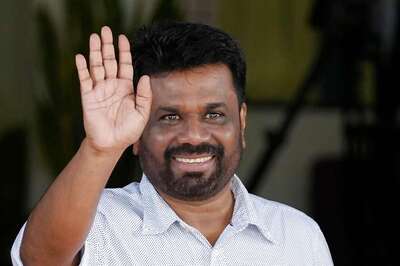
views
When Sonia Gandhi was named chairperson of the Congress Parliamentary party and authorised to pick leaders for both Houses, it was speculated that Rahul Gandhi may lead the flock in the Lok Sabha, a job which was earlier held by veteran Mallikarjun Kharge.
Since there was no clarity on Rahul Gandhi’s role in the party after he stood firm on stepping down as Congress president, party insiders surmised that he may instead focus on taking on the Modi government in Parliament. Alternatively, it was surmised that leader in the Lok Sabha would either be someone from Kerala or Punjab. After all, 23 of the 52 Congress MPs in the Lower House have been contributed by these two geographically apart states, even as the Congress was decimated in most parts of the country.
Predictably, several names were doing the rounds for the high-profile job. Three-term MP from Thiruvananthapuram Shashi Tharoor declared that he would be happy to take on this task if asked by the party. Another Kerala MP, Kodikkunnil Suresh, was also being mentioned as a probable for this post and when he took oath in Hindi, everyone was convinced that he was the party’s final choice.
Former minister and Congress spokesperson Manish Tewari, who won the Anandpur Sahib seat in Punjab, also figured in the list. It was believed Tewari would acquit himself well in the role of an opposition leader as he is bilingual, sufficiently feisty and cut his teeth in politics as a youth Congress leader.
It was, therefore, surprising when five-term West Bengal MP Adhir Ranjan Chowdhury was picked to head the principal opposition party in the 17th Lok Sabha. Described variously as aggressive, a local strongman and “Tiger of Bengal”, Chowdhury has held on to his Baharampur seat, having fought and won against the Left parties as well as the Mamata Banerjee-led Trinamool Congress.
Chowdhury has consistently stood his ground and has been winning on his own steam even though the Congress has been virtually wiped out in West Bengal. Chowdhury does not need the Congress to retain his seat. Instead, it is the Congress which needs him to keep the party flag flying even if it is in one constituency.
So what were the factors which favoured Chowdhury and worked against the others? Though the Congress realised it was important to recognise the fact that Kerala had bucked the national trend and voted decisively for the grand old party, it was felt that the southern state is adequately represented in the party’s higher echelons as Rahul Gandhi is now an MP from Wayanad.
Moreover, former Union minister and senior party leader from Kerala AK Antony and the younger KC Venugopal hold key positions in the Congress organisation. Antony is a member of the Congress Working Committee and sits in on all important party meetings while Venugopal is party general secretary in charge of the organisation. He is known to be close to Rahul Gandhi and was entrusted with the important task of selection of candidates in the recent Lok Sabha election.
The party believed it would be unfair to accommodate any more leaders from Kerala when it already has three senior representatives from the state. Nevertheless, Kodikkunil Suresh was named the party’s chief whip in the Lok Sabha, in deference to his seniority and to Kerala’s partiality for the Congress.
Punjab is the other state which demonstrated a degree of loyalty to the Congress in the recent general election. It was, therefore, believed Punjab’s contribution to the party’s Lok Sabha contingent should not go unrecognised. But the move was abandoned as it was felt that the Congress has a government in the northern state and has a strong, charismatic chief minister in Amarinder Singh heading it. The party decided it would avoid naming a leader from the state as it could result in the creation of two power centres. And it obviously does not want to upset the Punjab chief minister, especially at this critical juncture when the Congress is in the throes of its worst-ever crisis.
By naming Chowdhury, the Congress leadership has sent out a message to the party rank and file that it values grassroots workers and strong state leaders and that their work will not go unrecognised. Besides, he is hardworking, street-sharp and knows how to land a mean punch. The Congress also believes that Chowdhury’s aggression and passion for a good fight will make up for the party’s meagre strength in the Lok Sabha.
In addition, the Congress is hoping that Chowdhury’s elevation will enthuse him sufficiently to work for the party’s revival in West Bengal. To begin with, the new Lok Sabha leader can reach out to the workers who left the Congress and urge them to return to the party fold. Chowdhury has never shied away from battling the Trinamool Congress, even when the Congress leadership was extending a hand of friendship to Mamata Banerjee. Now that the Trinamool Congress is feeling the heat from a resurgent BJP, the Congress believes it has a window of opportunity in West Bengal. It is indeed a tall order but the Congress is depending on Chowdhury to do his fighting best.
(The author is a senior journalist. Views expressed are personal.)




















Comments
0 comment